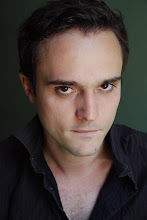#6: Frankenstein (1931)

I've never really sat down with any of the classic Universal Studios 1930's horror flicks. Sure they're iconic, and we owe a lot of our modern day mythos regarding these creatures to these films. Vampires weren't sexy until Lugosi donned the cape, and I recently heard that silver bullets had no effect on werewolves until Universal stepped in. As a child I taped a marathon of these films from TBS, but four minutes in I was bored to death. So I went through each movie, fast forwarding through all of the odious "plot development" and only watching the bits where the monsters appeared. It was for the best; there was no way I could have appreciated the subtle nuances of Frankenstein at that age.
We all know the story (more or less), so nothing to give away there. What surprised me about Frankenstein was that it blew away all of my preconceived notions about it. I had this image of an off-the-wall mad scientist, a fierce monster, a loony assistant, and a few innocent bystanders to keep us anchored in reality. Nothing of the sort.

Dr. Frankenstein is a complex character, young and brilliant and driven. He's been called mad for his theories about creating life, so he's shacked up in an old windmill, carrying on his research in private. He's willing to risk his reputation to do something truly unique with his life; we should all be so ballsy. I found myself identifying with him: relentless dedication to his craft, a complete disdain for the sanctity of human life, and unwavering pride. And his most famous line, one of the most-copied lines in cinema history... you know the one. "It's alive!" Perfect delivery. It's not overdone at all. This guy has just created life, so it's only natural he'd be a little excited.
The good doktor's assistant isn't a major player here, but tells us something about human nature. I'm referring, of course, to Fritz. Not Ygor, that was a later movie. Fritz isn't a snarling human mutant, but a rather mundane guy who happens to be a hunchback. The bell tower wasn't hiring, so the only job he could get was robbing graves and doing general bitch-work for Frankenstein (this was pre- Equal Opportunity). We almost feel sorry for him, until we see the way he treats The Monster. Being the perpetual underdog, he's all too eager to treat The Monster like crap. It's not often he meets someone below his station in life, and he enjoys feeling superior. Aren't we all guilty of this?

And The Monster. You'll see a lot of jabber about his name not being "Frankenstein." Well, it is. Sure, Doc Frankenstein never names him, because he never really thinks of him as a person, but he is the doktor's son. So his name should be (No First Name) Frankenstein. Simple. The point of The Monster being a child is driven home time and again. Dr. Frankenstein gets married towards the end, and everyone wants to know when he's going to have a child (followed by awkward pauses). When The Monster escapes, the first place he goes is a small house in the wild, where he meets a little girl who has just been left alone by her father as well. The two play together, furthering the parallels between them. The little girl drowns, and The Monster is burned alive for it. The moral goes out to the parents in the audience: if you create a life, you are responsible for it.
Frankenstein isn't perfect, just damn near. The exposition in the beginning goes on for just a little too long. A scene could have been cut out by combining the characters of Dr. Frankenstein's father and (whoever that other guy was). I feel like they explain Frankenstein's perception in the public eye three times in a row. Also, they seem to make such a big deal out of Fritz stealing a "criminal brain" for The Monster instead of a "normal brain," but I fail to see how this factors into The Monster's personality. He doesn't act like a criminal; he acts like a kid who occasionally throws temper-tantrums. Where the beginning is drawn out, the middle and end seem condensed. Lots of things happen just to progress the story. Frankenstein tells his friends and family to "go away" while he opens the door to invite them inside. He also is all too eager to decide to scrap his project at the first sign of trouble. A few more scenes of The Monster adjusting to life would have been gratifying. And the very beginning, where we are warned that the following movie might be "too scary"? What are you trying to do, talk down to your audience? It was in bad taste here, and it was in bad taste when they copied it for The Screaming Skull, which thankfully was torn asunder on Mystery Science Theater 3000. (@ 3:25, but finish my review first, ok?)
The fuzzy focus on such an old movie gives the whole thing a dreamy, ethereal feel. Not seeing it in sharp contrast makes me criticize the sets and costumes less, and accept the story and its messages more. The Wizard of Oz lost some of its magic in my eyes when I saw it on DVD for the first time. Suddenly I saw where the sets ended and the backdrops began, and I couldn't suspend my disbelief to the same extent. Luckily Frankenstein still holds up today, and its messages of human cruelty, personal ambition, and parental responsibility are eternal.
Z-Man sez: 9/10

No comments:
Post a Comment